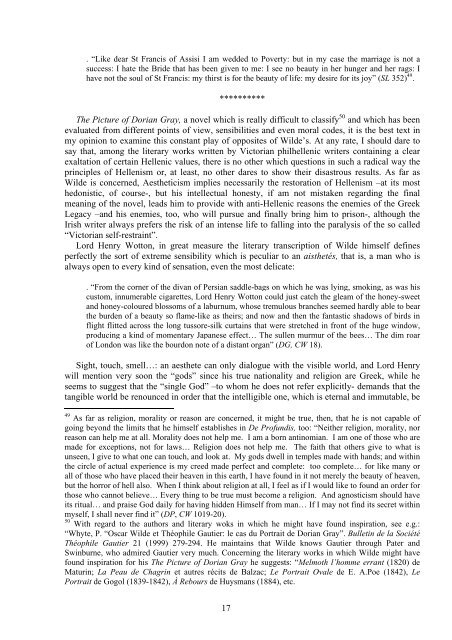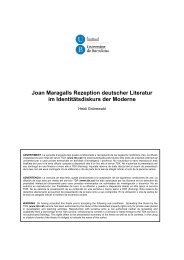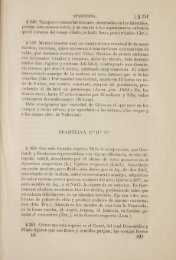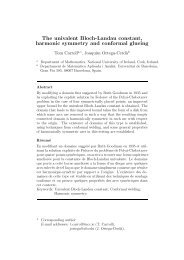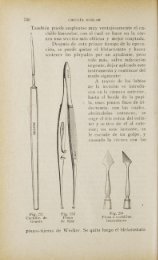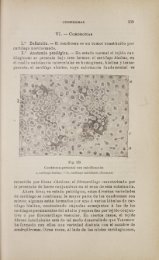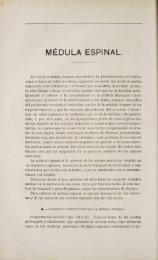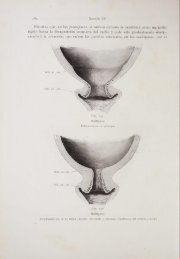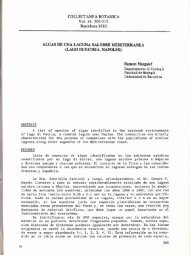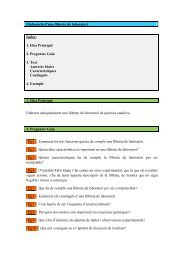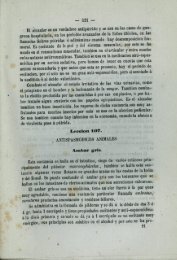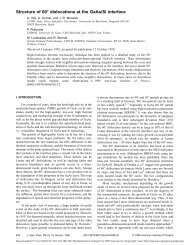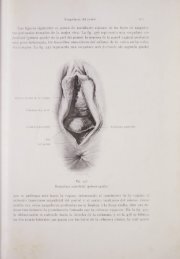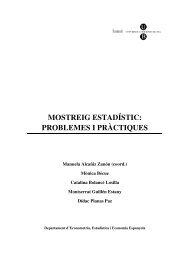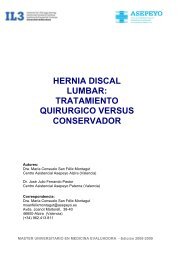Wilde Parsa ang_12080.pdf - Dipòsit Digital de la UB - Universitat ...
Wilde Parsa ang_12080.pdf - Dipòsit Digital de la UB - Universitat ...
Wilde Parsa ang_12080.pdf - Dipòsit Digital de la UB - Universitat ...
You also want an ePaper? Increase the reach of your titles
YUMPU automatically turns print PDFs into web optimized ePapers that Google loves.
. “Like <strong>de</strong>ar St Francis of Assisi I am wed<strong>de</strong>d to Poverty: but in my case the marriage is not a<br />
success: I hate the Bri<strong>de</strong> that has been given to me: I see no beauty in her hunger and her rags: I<br />
have not the soul of St Francis: my thirst is for the beauty of life: my <strong>de</strong>sire for its joy” (SL 352) 49 .<br />
**********<br />
The Picture of Dorian Gray, a novel which is really difficult to c<strong>la</strong>ssify 50 and which has been<br />
evaluated from different points of view, sensibilities and even moral co<strong>de</strong>s, it is the best text in<br />
my opinion to examine this constant p<strong>la</strong>y of opposites of <strong>Wil<strong>de</strong></strong>’s. At any rate, I should dare to<br />
say that, among the literary works written by Victorian philhellenic writers containing a clear<br />
exaltation of certain Hellenic values, there is no other which questions in such a radical way the<br />
principles of Hellenism or, at least, no other dares to show their disastrous results. As far as<br />
<strong>Wil<strong>de</strong></strong> is concerned, Aestheticism implies necessarily the restoration of Hellenism –at its most<br />
hedonistic, of course-, but his intellectual honesty, if am not mistaken regarding the final<br />
meaning of the novel, leads him to provi<strong>de</strong> with anti-Hellenic reasons the enemies of the Greek<br />
Legacy –and his enemies, too, who will pursue and finally bring him to prison-, although the<br />
Irish writer always prefers the risk of an intense life to falling into the paralysis of the so called<br />
“Victorian self-restraint”.<br />
Lord Henry Wotton, in great measure the literary transcription of <strong>Wil<strong>de</strong></strong> himself <strong>de</strong>fines<br />
perfectly the sort of extreme sensibility which is peculiar to an aisthetés, that is, a man who is<br />
always open to every kind of sensation, even the most <strong>de</strong>licate:<br />
. “From the corner of the divan of Persian saddle-bags on which he was lying, smoking, as was his<br />
custom, innumerable cigarettes, Lord Henry Wotton could just catch the gleam of the honey-sweet<br />
and honey-coloured blossoms of a <strong>la</strong>burnum, whose tremulous branches seemed hardly able to bear<br />
the bur<strong>de</strong>n of a beauty so f<strong>la</strong>me-like as theirs; and now and then the fantastic shadows of birds in<br />
flight flitted across the long tussore-silk curtains that were stretched in front of the huge window,<br />
producing a kind of momentary Japanese effect… The sullen murmur of the bees… The dim roar<br />
of London was like the bourdon note of a distant organ” (DG, CW 18).<br />
Sight, touch, smell…: an aesthete can only dialogue with the visible world, and Lord Henry<br />
will mention very soon the “gods” since his true nationality and religion are Greek, while he<br />
seems to suggest that the “single God” –to whom he does not refer explicitly- <strong>de</strong>mands that the<br />
t<strong>ang</strong>ible world be renounced in or<strong>de</strong>r that the intelligible one, which is eternal and immutable, be<br />
49 As far as religion, morality or reason are concerned, it might be true, then, that he is not capable of<br />
going beyond the limits that he himself establishes in De Profundis, too: “Neither religion, morality, nor<br />
reason can help me at all. Morality does not help me. I am a born antinomian. I am one of those who are<br />
ma<strong>de</strong> for exceptions, not for <strong>la</strong>ws… Religion does not help me. The faith that others give to what is<br />
unseen, I give to what one can touch, and look at. My gods dwell in temples ma<strong>de</strong> with hands; and within<br />
the circle of actual experience is my creed ma<strong>de</strong> perfect and complete: too complete… for like many or<br />
all of those who have p<strong>la</strong>ced their heaven in this earth, I have found in it not merely the beauty of heaven,<br />
but the horror of hell also. When I think about religion at all, I feel as if I would like to found an or<strong>de</strong>r for<br />
those who cannot believe… Every thing to be true must become a religion. And agnosticism should have<br />
its ritual… and praise God daily for having hid<strong>de</strong>n Himself from man… If I may not find its secret within<br />
myself, I shall never find it” (DP, CW 1019-20).<br />
50 With regard to the authors and literary woks in which he might have found inspiration, see e.g.:<br />
“Whyte, P. “Oscar <strong>Wil<strong>de</strong></strong> et Théophile Gautier: le cas du Portrait <strong>de</strong> Dorian Gray”. Bulletin <strong>de</strong> <strong>la</strong> Société<br />
Théophile Gautier 21 (1999) 279-294. He maintains that <strong>Wil<strong>de</strong></strong> knows Gautier through Pater and<br />
Swinburne, who admired Gautier very much. Concerning the literary works in which <strong>Wil<strong>de</strong></strong> might have<br />
found inspiration for his The Picture of Dorian Gray he suggests: “Melmoth l’homme errant (1820) <strong>de</strong><br />
Maturin; La Peau <strong>de</strong> Chagrin et autres récits <strong>de</strong> Balzac; Le Portrait Ovale <strong>de</strong> E. A.Poe (1842), Le<br />
Portrait <strong>de</strong> Gogol (1839-1842), À Rebours <strong>de</strong> Huysmans (1884), etc.<br />
17


